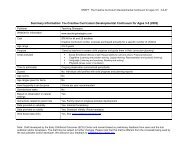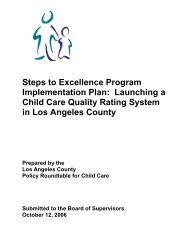Download this file - Plan4Preschool
Download this file - Plan4Preschool
Download this file - Plan4Preschool
Create successful ePaper yourself
Turn your PDF publications into a flip-book with our unique Google optimized e-Paper software.
Nutrition Services <br />
The California Department of Education (CDE) provides leadership and support of<br />
nutrition services to enhance the health, well-being, development, and educational<br />
potential of California’s children, adults, and families.<br />
The State Superintendent of Public Instruction has made nutrition, health, and physical<br />
education a top priority during his tenure. His commitment to these issues is outlined in<br />
Healthy Children Ready to Learn, which is available on the Healthy Children Ready to<br />
Learn Web site at http://www.cde.ca.gov/51114. In addition, the CDE has actively<br />
pursued creative approaches to addressing childhood obesity and other health issues<br />
and has produced reports by the Superintendent’s Task Force on Obesity, Type II<br />
Diabetes, and Cardiovascular Disease and the Advisory Committee on Nutrition<br />
Implementation Strategies.<br />
Meal Programs<br />
In California, more than 4.5 million nutritious meals are served on average each day at<br />
approximately 45,000 locations funded by the U.S. Department of Agriculture (USDA)<br />
through the National School Lunch, School Breakfast, Summer Food Service, and Child<br />
and Adult Care Food Programs. The CDE disburses approximately $1.6 billion in<br />
federal and state funds to support schools, child care centers, family day care homes,<br />
adult care centers, park and recreation centers, and other eligible agencies in providing<br />
nutritious meals and snacks. In addition, the CDE distributed $90 million in<br />
USDA-donated food to eligible public and private nonprofit agencies throughout the<br />
state for use in preparing meals.<br />
The CDE also administers the:<br />
• Special Milk Program, which assists schools, summer camps, and eligible<br />
agencies in providing over 4.3 million one-half pint servings of milk to children<br />
annually.<br />
• Commodity Supplemental Food Program, which monthly provides 53,000<br />
low-income, breast-feeding mothers, pregnant women, children under age five,<br />
and the impaired elderly with USDA-donated foods designed to meet their<br />
nutritional needs.<br />
The CDE provides nutrition and food service education and training to child nutrition<br />
program operators and educators, collaborates with numerous education, health, and<br />
nutrition-allied organizations, and is affiliated with advocacy and professional<br />
organizations.<br />
A new federal law required districts participating in the National School Lunch or<br />
Breakfast Program to adopt a local school wellness policy by the beginning of the<br />
2006-07 school year, and the CDE is providing leadership and resources to support<br />
implementation and evaluation of <strong>this</strong> new law. At a minimum, the policy must include:<br />
82
















